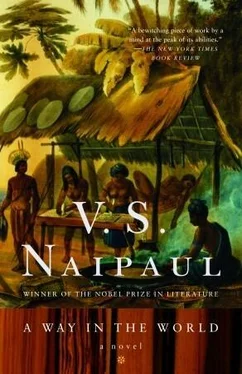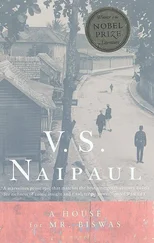He wrote a second letter. This was clearly the work of an inflamed brain: the writer thought I was going to walk through the door at any moment. The letter was on an air-letter form; half-way through, the handwriting, that to me was so full of his character, broke up. Though the letter had been addressed, it hadn’t been finished: some kind of failure had occurred during the writing, and he had saved his energy for the address.
De Groot had, in fact, written both letters from a hospital. I had written to him when he was dying. The planning and writing of a book can be attended by such coincidences.
For years after I left East Africa I used to think of going back one day to have another look, do the long drives. That idea had always assumed that De Groot would be there, to guide, interpret, pass me on to people, and give me the news. He would have been the man to whom I would have brought back my stories. Without him there was no point in going back. I wouldn’t have known how to move; it would have been another country.
I suppose it would have been possible twenty-five years before to foresee the shrinking of his life to the settler parody at the end. I know that worry about the future did come to him later. But while he was on the compound — still young and finding friends, and doing generous things like arranging the meeting between Blair and me — he was serene. The country had already begun to go very bad — and he knew it — but he was in the full joy of his African life.)
With his background De Groot would have understood the tensions between Blair and me. He didn’t have to be told anything. And when he said to me one day that he had met Blair and got on with him, and that I should meet him too, I knew at once that De Groot had been doing a little work and that such a meeting would be all right. Blair would have felt the same. So even before we met a kind of goodwill had been established.
We met late one afternoon on De Groot’s narrow back verandah, concrete-floored and perfectly open, just a few inches above the ground, with weathered wicker chairs and a low, bleached, ring-marked table, with a certain amount of junk pushed together in a corner against the kitchen wall. Beyond the little sloping strip of lawn — De Groot liked to water that — the land fell away, seemingly to bush; and from the hidden settlements below — settlements living off the compound — there came a sound of African voices.
In 1949, when I was seventeen, I had thought of Blair as a young man. Now he seemed to me middle-aged: he was close to fifty, and I was not yet thirty-four. The wonderful physique had thickened up; he seemed to be less neat in his movements, more assertive, to be taking up more room. Before I could think too much about that he put things right: he made the first gesture.
He said, “I tell people I saw you do your first piece of writing.” Then he addressed De Groot as well. “It was in the department where we both worked. He wrote an article about a black beauty competition. He showed it to one of the typists and she didn’t like it. She thought he mocked the black M.C. too much.” He gave a deep laugh. “As soon as I began to hear about it I recognized the fellow.”
I had often thought later — in England, when my writing career appeared not to be starting — of that joyous time of pretend-writing in the department. It took me six years to see what was wrong with that article about the beauty competition. The seventeen-year-old writer was too falsely knowing: his judgements, the angle of his observations, his jokes suggested he knew another, better world. That phantom world, which came with the first, innocent wish to be a writer, was hard to get rid of.
And it occurred to me now, considering Blair’s freer movements in De Groot’s verandah and a laugh bigger than I remembered, that at about the same time Blair might have come to the realization that the character he had been presenting to the world — the self-made man, still striving, looked up to by all, correct, with the manners of his special community — was in some essential way false to himself. He might have been granted another vision of his isolated community living in the debris of old estates; he might have taken their story back and back, to unmentionable times. And he might have decided then — like me as a writer — to remake himself.
We met at about half-past four. Blair left us at about six, when it was beginning to grow dark and cooking smoke from the chattering settlements below began to rise through the bush. We talked of meeting again. He mentioned dinner in his bungalow. (I thought of the burden on his houseboy, Andrew’s kinsman.)
There was no further meeting. He didn’t live. I was left only with those ninety minutes, and, as can happen after an unexpected or brutal event, ironies began to attach to every gesture and statement of Blair’s that came back to me. It is hard to believe on such occasions that a person doesn’t have, deep down, at some hidden level, an intimation that he has closed the circle and is near the end of things, and hard to believe that this knowledge doesn’t break through a person’s words and actions in a coded way.
And, in fact, at that last meeting Blair did speak, if not in code, in an oblique way of things that were important to him. Breaking into something De Groot was saying, he said, quite early on, spacing out the words, and with pointing gestures that made him seem enormous in the little verandah, “I know that the world I will be leaving is better than the one I came into.” That was a simple racial statement, easy to understand. It explained his passion, his politics; and it was true: the revolution he had taken part in had succeeded.
But then a little later he softened the aggression of those big gestures. We were talking of insurance companies and medical tests, and he told a story of going to get a test in a clinic in New York. After his details had been taken down, he was given a dressing gown and told to go to a cubicle and undress. The dressing gowns were in four colours. The colours had no significance and the gowns were given out at random, but when the gowned men gathered in a waiting room, dressing-gown colour groups tended to form. He might have begun this as a serious story, but when De Groot and I laughed at the absurd picture he was creating, he laughed too.
Much later on, when De Groot was talking of tribal politics in East Africa, Blair gave the conversation an unexpected turn. We were all tribalists and racialists, he said; we could all easily fall into that kind of behaviour, if we thought we could get away with it. He told another story. He was in New York, at a railway station, and standing in line to buy a ticket. (He had a United Nations posting and New York was the setting of many of his stories.) The couple at the head of the line were causing a delay. They were an Asian couple: Blair couldn’t say whether they were Filipinos or Malays or Indonesians or Chinese. They couldn’t speak English. It took a long time for the clerk to establish where they wanted to go; and it was only after the clerk had given the tickets that the man began to look for money to pay. Blair found himself saying, “What’s the matter with that damned Jap?” And the white man in front had turned and looked at Blair with great disregard.
It was a simple story; Blair and I had grown up surrounded by rougher racial manners and hearing much worse things about all races. But this was more than a story Blair was telling against himself. This was a story to tell us where he had got to; it was an offering to the two of us sitting with him in the fading light. Taken together with what he had said earlier in the afternoon, it was like a statement, made without excuse or apology, that after the passion of his politics he could now be another kind of man, ready for new relationships. De Groot, with his sensitivity in these matters, would have picked up something like that during his own meeting with Blair; and I found myself moved by what I thought Blair was saying. He expected his racial passion to be understood; he didn’t think he had to explain it. That was impressive; it made me think afresh of his lost community in the blighted cocoa woods. I also liked the generosity, and the clumsiness, of his last story. The statement he had made could have been made only obliquely or in code, and with that kind of clumsiness; that was moving in itself. All three of us might have found plain words difficult.
Читать дальше












